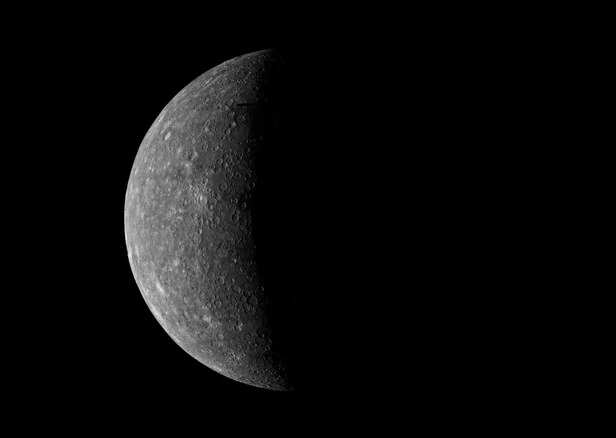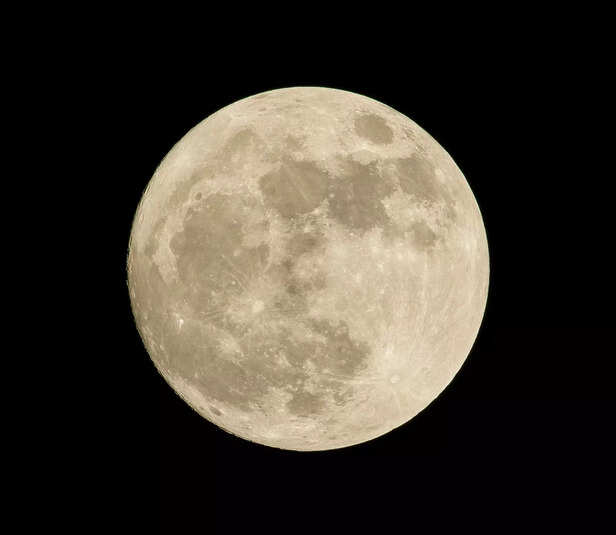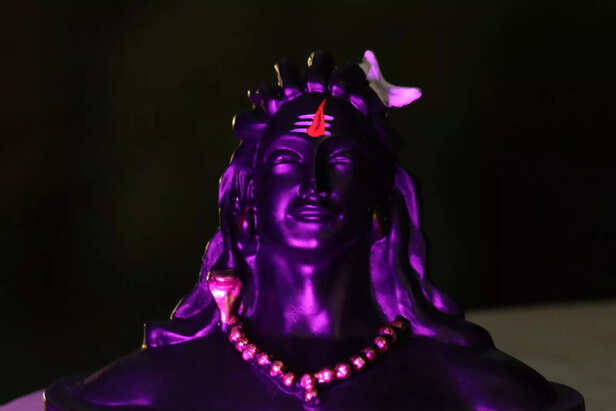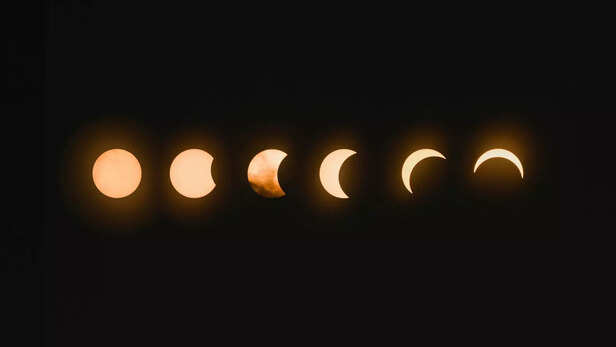Why Even the Moon Has a Scar: The Two Forgotten Curses of Chandra
Riya Kumari | Aug 01, 2025, 22:22 IST
( Image credit : Times Life Bureau )
In Hindu mythology, Chandra, the moon god, fell in love with Tara, the wife of Brihaspati, and abducted her, violating cosmic order and dharma. This led to a divine war, and though Tara was returned, she bore Chandra’s son, Budha. As punishment, Chandra was cursed—first by Brihaspati to lose his brilliance, then by Daksha for favoring one wife, Rohini, over his 26 others, causing him to wither. Broken and repentant, Chandra sought Lord Shiva’s help, who granted him partial relief through the cycle of waxing and waning, allowing him to shine again but never without the scars of his karma.
In the night sky, the moon looks gentle. Pure. Poetic. But if you’ve ever looked closely, you’ll notice a blemish. A scar. Not random. Not meaningless. Not just a crater. It’s a reminder etched in time, of desire, transgression, and the quiet justice of the cosmos. This scar is spoken of in the scriptures. In the Vedas, the Puranas, and in oral traditions passed down through time, the story isn’t just about a celestial body. It’s about Chandra, the moon god. And the price he paid for desiring what wasn’t his to desire.
The Desire That Broke Dharma

Chandra fell in love with Tara, the wife of Brihaspati, the guru of the gods, the teacher of dharma itself. Tara was not only another’s wife, she was sacred by association. To covet her wasn’t merely romantic rebellion. It was a direct violation of cosmic order. Yet love or what we call love, does not always wait for reason. Chandra abducted Tara. Some versions say she came willingly. Others say she was taken. But the point is not about consent. The point is: even gods are not above consequence.
A war followed. Gods, demons, sages, all were drawn into the conflict. The lines between right and wrong blurred. And in the end, Tara was returned, but pregnant. From this union, Budha (Mercury) was born. A child of passion, confusion, and karmic entanglement.
The Scar of Chandra

For his betrayal, Chandra was first cursed by Brihaspati, the very husband of Tara, to lose his brilliance, his glow dimmed by the weight of his actions. But his troubles didn’t end there. Chandra had also married Daksha’s 27 daughters, the Nakshatras, the stars who circle the sky. Yet he loved only one, Rohini and neglected the rest. Feeling insulted, Daksha cursed him too: that he would wither away, losing his luster day by day.
Even today, what we call the "spots" or "craters" on the moon, Hindu tradition sees as the visible karma of a god who forgot dharma in the pursuit of beauty.
The Boon of the Crescent

Fading and broken, Chandra turned to Lord Shiva, who, moved by his repentance, gave him relief. a cycle of waning and waxing. a second chance to shine. But not without memory. Not without the scar that still marks his surface, a quiet reminder that even divinity bends to dharma, and every choice leaves its mark.
This is why the moon wanes, growing dim until Amavasya (new moon), and then waxing again toward Purnima (full moon), when he is in his full glory, whole, radiant, and temporarily free of decay. And on Purnima, Chandra’s body is said to be fully restored, glowing with divine light, a brief reward for a long cycle of penance.
Why This Story Matters

This isn’t a story to moralise love. It’s a story to show that love without boundaries becomes fire, not warmth. That dharma isn’t a chain, it’s a structure that keeps love sacred, not selfish. Chandra wasn’t evil. He was radiant, charming, and loved by all.
But he let desire overpower discernment. And for that, he didn’t burn in hell, he shone with a scar. Because in Hindu dharma, punishment isn’t about cruelty. It’s about correction. Karma doesn’t shame. It balances.
The Hidden Wisdom in the Night Sky
So next time you look up at the moon, Don’t just see beauty. See balance. See the cost of crossing a line, even in love. See the compassion of a universe that doesn’t destroy a soul for one mistake, but marks it, teaches it, and allows it to shine with remembrance. That’s the grace of Hinduism. It doesn’t say you’ll be condemned forever.
It says you’ll carry what you create, until you learn to carry it with wisdom. Even the moon… still shines. But never forget: Even the moon has a scar.
The Desire That Broke Dharma

Mercury
( Image credit : Unsplash )
Chandra fell in love with Tara, the wife of Brihaspati, the guru of the gods, the teacher of dharma itself. Tara was not only another’s wife, she was sacred by association. To covet her wasn’t merely romantic rebellion. It was a direct violation of cosmic order. Yet love or what we call love, does not always wait for reason. Chandra abducted Tara. Some versions say she came willingly. Others say she was taken. But the point is not about consent. The point is: even gods are not above consequence.
A war followed. Gods, demons, sages, all were drawn into the conflict. The lines between right and wrong blurred. And in the end, Tara was returned, but pregnant. From this union, Budha (Mercury) was born. A child of passion, confusion, and karmic entanglement.
The Scar of Chandra

Moon
( Image credit : Unsplash )
For his betrayal, Chandra was first cursed by Brihaspati, the very husband of Tara, to lose his brilliance, his glow dimmed by the weight of his actions. But his troubles didn’t end there. Chandra had also married Daksha’s 27 daughters, the Nakshatras, the stars who circle the sky. Yet he loved only one, Rohini and neglected the rest. Feeling insulted, Daksha cursed him too: that he would wither away, losing his luster day by day.
Even today, what we call the "spots" or "craters" on the moon, Hindu tradition sees as the visible karma of a god who forgot dharma in the pursuit of beauty.
The Boon of the Crescent

Shiva
( Image credit : Pixabay )
Fading and broken, Chandra turned to Lord Shiva, who, moved by his repentance, gave him relief. a cycle of waning and waxing. a second chance to shine. But not without memory. Not without the scar that still marks his surface, a quiet reminder that even divinity bends to dharma, and every choice leaves its mark.
This is why the moon wanes, growing dim until Amavasya (new moon), and then waxing again toward Purnima (full moon), when he is in his full glory, whole, radiant, and temporarily free of decay. And on Purnima, Chandra’s body is said to be fully restored, glowing with divine light, a brief reward for a long cycle of penance.
Why This Story Matters

Moon phases
( Image credit : Unsplash )
This isn’t a story to moralise love. It’s a story to show that love without boundaries becomes fire, not warmth. That dharma isn’t a chain, it’s a structure that keeps love sacred, not selfish. Chandra wasn’t evil. He was radiant, charming, and loved by all.
But he let desire overpower discernment. And for that, he didn’t burn in hell, he shone with a scar. Because in Hindu dharma, punishment isn’t about cruelty. It’s about correction. Karma doesn’t shame. It balances.
The Hidden Wisdom in the Night Sky
It says you’ll carry what you create, until you learn to carry it with wisdom. Even the moon… still shines. But never forget: Even the moon has a scar.
